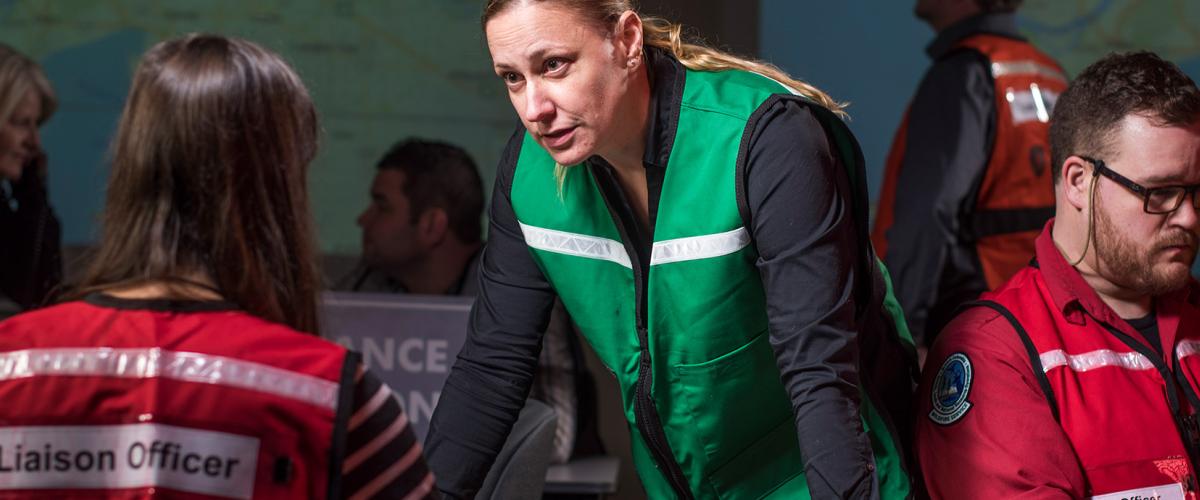
Is this program right for you?
If you are a working professional wanting to make a difference in helping mitigate and respond to emergencies and disasters, this program is for you.
Applied Knowledge and Skills Development
Gain the applied knowledge and skills to advance your rewarding career in emergency management, security management or public safety.
A Self-Paced Diploma Program
Complete a diploma program full- or part-time, online, and at a pace that works for you.
The Diploma in Emergency and Security Management is ideal for people looking to looking to start or enhance their career in emergency management, security management or public safety.
The option to complete the program full- or part-time program that enables them to start a career in an exciting field or take their existing career to the next level.
Graduates of the program have a solid knowledge base and the skills to pursue leadership roles across the public safety sector.
They have the theoretical, methodological, and technical competencies required for a career in security and emergency management.
Graduates have gone on to careers in emergency management, disaster planning and security.
They include those who have strong organizational skills, a background in planning or administration, experience as a search and rescue volunteer or in various emergency services positions, demonstrated a desire to serve the public, and an ability to work well under pressure with strong teamwork and communication skills.
Subjects
- Emergency Management, Disaster Planning and Public Safety
- Business Continuity
- Risk and Crisis Management
- Security and Intelligence
- Business Administration
- Leadership and Management
What You Need to Graduate
The program consists of 20 courses, totalling 60 credits.
Students who successfully complete all the courses will receive their Diploma in Emergency & Security Management.
Program Format
This program is paced and facilitated online. Students have the opportunity to collaborate and share experiences in an interactive online learning experience. Courses are facilitated by faculty who are experts in their fields.
Students can pursue their studies full-time or part-time.
Full-Time
Full-time students generally take three to five courses per semester. Students need to take a minimum of three courses per term to be considered full time. All program courses are offered between the September (Fall) and January (Winter) terms with special offerings during the May (Summer) term. Students can expect to complete their program in two years.
Part-Time
Part-time students generally take one to three courses per semester. All program courses are offered between the September (Fall) and January (Winter) terms with special offerings during the May (Summer) term. Students can expect to complete their program in three years.
Time Commitment
Courses run on a 14-week term in the fall and summer, and a 15-week term in the winter. Although most activities do not require students to be online at a specific time of day, students must be active in their courses on a weekly basis. Some courses will have scheduled online lectures and events though instructors will try to record these for students that can’t attend live. Plan to dedicate approximately six hours per week for each course.
Degree Option
Designed in a laddered format, students can move on to complete the Bachelor of Emergency and Security Management after graduating with the diploma. Contact the program director for more information.
Upcoming Intakes
There are three intakes each year in September, January, and May.
Tuition
The Diploma in Emergency and Security Management is a 60 credit or 20-course program. Tuition fees are charged on a per course basis. (See the course pages for descriptions and prices).
Total tuition fees are approximately $11,750.*
Note
*All costs are current as of April 1, 2021 and apply to Canadian citizens and permanent residents. Prices are subject to change. Applicable fees and taxes are extra.
For information about International Student Tuition and Fees, visit the International Students page.
Textbooks & Supplies
Some courses have open source textbooks or a series of readings and resources embedded in the course materials.
A number of courses have textbooks. Textbooks for each course can be obtained a number of ways. They can be purchased through the JIBC Store, purchased directly from the publisher, or purchased through online retailers such as Amazon or VitalSource. A current list of courses is available in the ESMS Online Campus, a resource site available to current students.
STEP ONE - Apply to the Program
Apply by registering online at EducationPlannerBC and completing the online program application form.
Write a letter of approximately 250 words describing your interest in the program, and detailing how you intend to manage your studies with your other responsibilities to ensure your success in the program.
STEP TWO - Submit Supporting Documents
Submit the entrance letter and official transcripts (high school and any/all post-secondary studies) in person or by mail.
Mail
Admissions Officer
Justice Institute of British Columbia
715 McBride Boulevard
New Westminster, BC V3L 5T4
Credit Transfer and Program Laddering
For more information on transferring credit from another post-secondary institution, see Recognition of Prior Learning (RPL) Information and Application.
Graduates of the Emergency Management Certificate program receive credit for ESMS-1300 and ESMS-2300, as well as 6.0 credits toward their security and emergency management electives.
Application Deadlines
January start: November 29
May start: April 5
September start: August 3
Complete applications must be received no later than the dates posted above. Once accepted into the program, you will receive information on how to register for courses.
Admission Requirements
- High school graduation diploma (or equivalent)
- Grade 11 mathematics with a minimum grade of C (or equivalent)
- Grade 12 English / Grade 12 First Peoples English with a minimum grade of C (or equivalent)
For more information, contact the program director.
Required Documents
- A copy of your high school transcript
- A letter of approximately 250 words describing your interest in the program, and detailing how you intend to manage your studies with your other responsibilities to ensure your success in the program.
Financial Aid & Awards
This program is eligible for student loans, external awards and JIBC awards, bursaries and scholarships.
International Applicants
International applicants interested in this program are encouraged to visit the International Studies page or contact JIBC's Office of International Affairs.
Q: I’m not a Canadian citizen, can I still take the program?
A: International students are welcome to apply to the program. International application and tuition fee rates apply.
Q: How long will it take to complete the program?
A: It depends on how many courses you take.
Part-time Studies (one to three courses per semester)
Diploma: 2.5-3 years
Degree: 5-6 years
Full-time Studies (three to five courses per semester)
Diploma: 2-2.5 years
Degree: 4-5 years
Q: Can the program be taken entirely online?
A: Yes.
Q: Can I take some classes in person?
A: Not at this time.
Q: I’ve completed the EM certificate program. Can I get credit for any courses?
A: Graduates of the EM certificate program receive credit for ESMS-1300 Foundations of Emergency Management I (3.0 credits) and ESMS-2300 Foundations of Emergency Management II (3.0 credits).
Q: I’ve completed the Exercise Design certificate program. Can I get credit for any courses?
A: Graduates of the Exercise Design certificate program receive credit for ESMS-3360 Exercise Program Management.
Q: I’ve taken a couple of other emergency management courses through the JIBC. Can I get credit for them?
A: The degree program comprises a series of specific core courses. Individual courses offered by EMD cannot be transferred in.
Q: I’ve taken some courses/completed a diploma/degree at another institution. Can I transfer credit in?
A: You may be able to get credit for relevant course work completed at another institution. See JIBC’s policies and procedures as they relate to transfer credit.
Q: I’ve worked in the field for 15 years. Can I get credit for that?
A: You may be able to get credit for relevant experience. See JIBC’s policies and procedures as they relate to Prior Learning Assessment (PLA).
Q: I graduated from high school 25 years ago; do I need an official transcript?
A: We require an official (sealed) transcript(s) confirming that you meet the admission requirements of high school graduate (or equivalent), grade 12 English with a minimum grade of C (or equivalent), and grade 11 mathematics with a minimum grade of C (or equivalent). If you have completed credit courses (not continuing education) at another post-secondary institution, you should submit official transcripts reflecting all post-secondary work. In this case, you may not need to provide your secondary school transcript. It will depend on the type of courses you have completed and the institution’s admission requirements.
If you have not completed courses at another post-secondary institution, contact the Ministry of Education. They should be able to provide you with a secondary school transcript.
Q: Do you have a mature student policy?
A: Students who are at least 21 years of age who do not have BC Grade 12 or any of the equivalencies listed in the Grade 12 equivalency procedures but meet all other admission requirements may, with the approval of the Registrar or designate, be admitted into the program based on other qualifications or experience. However, all students are required to meet specific course prerequisites.
Students without grade 11 mathematics or grade 12 English are required to complete the appropriate equivalent. For more information see the JIBC’s Admissions policy and procedure.
Q: Can I start the program in January/May?
A: Yes. See the deadlines in How to Apply for specific time frames for submitting your application.
Q: Will I need to buy textbooks?
A: Textbooks are required for a number of courses. You can order these from the JIBC Store, the publisher, or online retailers before the start of the semester.
Q: Do I need to be employed in the field?
A: No.
Q: Does this program qualify for BC student loans?
A: Yes. Please see information on JIBC Financial Aid & Awards.
